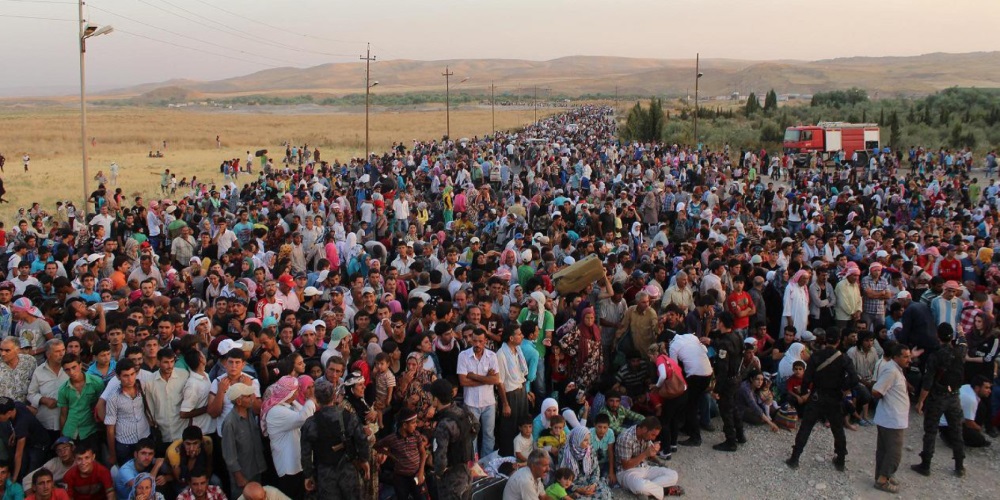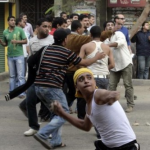Deprecated: trim(): Passing null to parameter #1 ($string) of type string is deprecated in /home/aoiusa/public_html/wp-content/plugins/sexybookmarks/public.php on line 388
Deprecated: trim(): Passing null to parameter #1 ($string) of type string is deprecated in /home/aoiusa/public_html/wp-content/plugins/sexybookmarks/public.php on line 394
Deprecated: trim(): Passing null to parameter #1 ($string) of type string is deprecated in /home/aoiusa/public_html/wp-content/plugins/sexybookmarks/public.php on line 400
Source: Chronicles of Culture
By:Srdja Trifkovic | November 13, 2015
Over 8,000 migrants entered Serbia on November 11 on their way from the Middle East to Western Europe. The item went unreported by the major media because it was not newsworthy. Daily totals may vary, not much, as the Great Invasion of 2015 continues unabated.
Millions are on the move, with unknown further multitudes tempted to follow suit. They will do so because Europe, rich and decadent, irresistibly tempts them. In all creation disease and frailty invite predators, as witnessed in the scene of Madame Hortense’s death in Zorba the Greek. Both the loss of the will to define and defend one’s native land and culture, and the loss of the desire to procreate, send an alluring signal to the teeming kazbahs and sukhs: Come, ye all, there’s money for nothin’ and chicks for free. Come, for no Western nation has the guts to shed blood—alien or its own—to keep you out in the name of its own survival. According to the leading German daily Die Welt (October 14), “Merkel’s call of welcome echoes even in West-Africa. The German welcome-culture appeals in Mali even to those who did not want to leave until now. TV pictures of nice people with welcome presents lure migrants. German visas can be bought.”
Spengler famously heralded The Decline of the West ninety years ago, but the English title of his magnum opus did not convey the dark, tragic implications of the word Untergang, “going under.” Spengler himself did not anticipate a cataclysmic event but rather an extended decline, a twilight. (Abendland, the West, literally means the “evening land.”) It now appears that the protracted fall is over, and the stage is set for a series of quick, brutal catastrophes.
The German media are by now positively blasé about the numbers. According to the leading weekly magazine Der Spiegel, “Between September 5th and October 15th 409,000 new migrants reached Germany, 10,000 every day.” Ten thousand a day equals three and a half million a year. Incidentally, the number of migrants the European Union expects to arrive next year is three million. Die Presse, one of Germany’s leading news magazines, noted on November 5 that “the experts in Brussels say that until 2017 the influx of refugees into the EU will not abate.”
This is an eminently Muslim invasion. As the Tagesspiegel wrote on August 27, “at least 80 percent of immigrants are Muslims . . . Some mosque communities have doubled within a month.” The information came from a reliable source, Germany’s Central Muslim Council. The Western media, in their fits of the pornography of compassion, dwell on the suffering—alleged or real—of women and children “refugees,” but there are not many of them to be found in the migrant onslaught. According to the respected Austrian daily Die Presse (October 3), “Eighty percent of the refugees are young men under thirty.” It is estimated that a further ten percent are men in other age groups. They are pushy, arrogant, and often aggressive if if their demands for passage and amenities are not obliged promptly enough. In Hamburg they were furious about being temporarily accommodat in a warehouse because there were no more vacant apartments in the city. “We were shocked when we arrived here,” said Syrian refugee Awad Arbaakeat.?
Nobody knows who is coming into Germany and other European countries. “About one half of the refugees don’t get registered,” the respected Focus magazine reported on November 3 (“The great registration chaos”). “Numbers or even estimates about the number of refugees staying in Germany without registration are not available to us,” Federal Office for Migration and Refugees (BAMF) told the magazine. “It’s simply impossible to register everyone at the border.” Other news sources report that 73 percent of invading aliens don’t have any papers at all: “We are all Syrians now, thanks to the new forged papers – Africans, Albanians, Kosovars, and Chechens,” says one. “A Syrian passport is the best document to open the door to Europe right now.”
The situation in the majority-Muslim ghettos all over the EU had been dire even before the ongoing onslaught. It is now rapidly becoming unmanageable. “Police warn of no-go-areas in Germany,” was Der Spiegel’s headline on July 25. The ability of the police to uphold public order in certain localities “is uncertain in the long term” and ‘in serious danger,” president of the German Police Union Rainer Wendt told the magazine. “In Berlin or in northern Duisburg there are neighborhoods where colleagues hardly dare to stop a car, because they know that they will be promptly surrounded by 40 or 50 men.”
The immigrants’ propensity to criminality is supposed to be a secret, however. That organ of Germany’s bourgeois establishment, the FAZ (Frankfurter Allgemeine Zeitung), on November 13 quoted Germany’s chief of criminal police Ulf Küch as saying: “In this country nobody likes to talk about the criminal behavior of the refugees.” At the same time, police in Germany are known to have asked newspapers not to report about the problems police are having with the refugees.” The Press Council of Austria has decided that the identity of foreign criminals should be concealed in media reports: “People of same origin could feel hurt and discriminated. The First Senate of the Press Council therefore urges more restraint and sensitivity“?
Thousands of refugees have disappeared from their German and Austrian camps without trace, but “local authorities point out they have no authority to make the people stay.” They can communicate, however: mobile provider Yourfone donated 50.000 German SIM cards to “refugees”—but without verifying their identity, as the German law mandates.
The response of the establishment is clear: “Europe has to take migrants and to relinquish sovereignty.” (Die Welt, November 3). According to the vicechairman of the Social Democratic Party of Germany (SPD) Thorsten Schäfer-Gümbel, “we must not give right-wing extremist criminals in the leadership of Pegida [an anti-immigrant movement] a single millimeter of room. The hatred from Pegida lays the ground for packs of thugs that assault refugees or set fire to their camps.” And Roman Catholic Bishop Franz-Josef Overbeck, comparing the transit campt for the migrants to the Nazi concentration camps, asked the nation to be “more welcoming.”

Once upon a time the West and the Muslim world could clearly define themselves vis-à-vis each other in a cultural and political sense. What postmodernity and secularism have done, since replacing Christianity as the guiding light of the West, is to cast aside any idea of “our land,” of a space that is European (or indeed American) in the ethnic, geographic, and cultural sense, a space that has an external boundary and that should be protected from all those who covet it but to whom it does not belong by birthright.
That same problem faces us even more starkly today, as the West faces two clear alternatives: determined defense or eventual submission and—as V.S. Naipaul eloquently put it – our acceptance of sacred Arab places and culture as “our own.” And what will Europe get in return for giving up all that she has? “What kind of art can there be, when human beings cannot be represented? What kind of philosophy, where thinkers must accept the crudest fatalism as the revealed word or an absolute first principle?” And Europe stands to lose everything that makes civilized life worth living, from the Magna Carta to the prosciutto, from the grand opera to the grand cru, from St. Peter’s in Rome to St. Paul’s in London . . .
The monsters in Berlin, Brussels, Paris, Rome, Stockholm and everywhere else who are allowing this abomination to happen, and their gauleiters in the media, are guilty of the greatest betrayal in human history. What they are doing is evil beyond words and beyond endurance. They will suffer the consequences in the fulness of time, of course, because the invaders will not feel any debt of gratitude; but by then it will be too late for the finest civilization the world has ever known.



